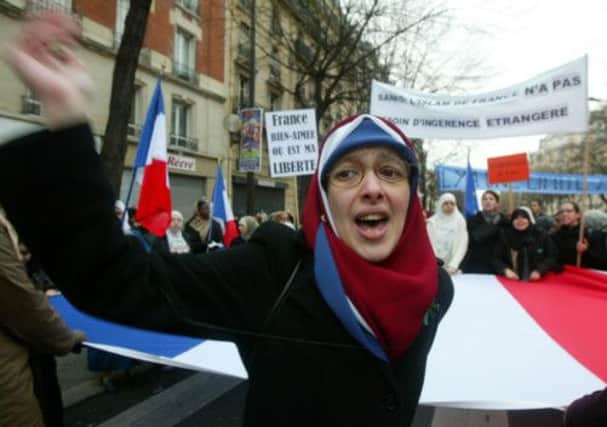Allan Massie: Veil dramatically divides two concepts


A heat wave in Paris as there has been here, and rioting and car burning in the commuter town of Trappes. What’s new? In one sense, very little. Hot weather, disaffected youth, and riots go together. And yet these particular ones are of some interest to us, partly because they have been triggered by the attitude of the French Republic to cultural differences, an attitude very different from the one prevailing here.
They were set off when a woman was stopped and fined for wearing the full Islamic veil. This is now illegal in France, following a law passed by the government of the last president, Nicolas Sarkozy. The fine is modest, €130, though of course no fines are modest to the poor. But it is the principle that is at stake, or rather the collision of two principles: what Islamists insist their understanding of their religion requires on the one hand, and the secular values of the Republic on the other.
Advertisement
Hide AdAdvertisement
Hide AdBoth France and the United Kingdom have experienced large-scale immigration from Muslim countries. In both countries there are areas of cities and towns where a majority of the population is now Muslim. This has caused some resentment, and spawned a lot of wild talk about the “Islamification” of the country. This is a gross exaggeration. Nevertheless, the fear is there and is stoked by some politicians.
Both France and Britain are now multicultural countries, but multiculturalism is understood differently either side of the Channel. The response to this development is therefore different, and the difference is explained by historical understanding of the concept of the state and the ideas of liberty and equality. Historically, the British state has been weak, in the sense that it did not interfere with private life. Everything was permitted which was not expressly prohibited by law. In France, the state has been strong, and liberties are prescribed. In Britain, the State has said what you can’t do; in France what you can. In practice of course the difference is blurred and the theoretical extremes come together. Nevertheless it is this philosophical difference which has determined the two countries’ attitude to multiculturalism.
The British response has been laissez-faire (odd that we need a French term for what is very British). There has been very little attempt to compel immigrant groups to become British – though of course the majority of immigrants do come to identify themselves as British, at least in the second or third generation. Laws relating to immigrant communities have been passed to outlaw discrimination against them. But if they don’t choose to conform to what is loosely termed “the British way of life”, that’s their business, so long as they are law-abiding. Until very recently there has been no attempt to insist that they learn to speak English.
The French response is statist, based on the affirmation of the republican values of “Liberty, Equality and Fraternity”. Translated into practical terms, this essentially means that immigrants, individually and as a group, are expected to become French. They can’t claim special privileges on account of their religion; the Republic is after all a secular state, without an established church. Conflicts between church and state , or rather between clericalism and laicite, were fierce throughout the years of the Third Republic (1871-1940). Translated into contemporary terms, immigrants are entitled to no special treatment, no enshrined rights different from whose enjoyed by other citizens. To offer this would offend the principle of equality.
Hence the ban on the burka. Michele Alliot-Marie, justice minister under Sarkozy, declared that “the wearing of the niqab or burka is a problem that affects our ability to live together, the values of the republic, and in particular human dignity... for instance, someone who would be seeking French citizenship and whose wife wears the veil is someone who would not appear to be sharing the values of our country.” It’s difficult to imagine a government minister here speaking so bluntly, with such self-assurance. The law in France takes the same line. In 2009 a court denied citizenship to a veiled Moroccan woman on the grounds that her “radical” practice of Islam was incompatible with French values.
Islamists resent and oppose the restriction. Hence the riots over the last few days. One should note however that there many young French people of Arab origin who think differently. Examples from fiction are rarely entirely convincing, but may be indicative of attitudes. The Algerian novelist, Boualem Sansal, who, like many North Africans chooses to write in French, has a young character, Malrich, in his book Le Village de l‘Allemand (published here as An Unfinished Business) compare the Islamists, who are trying to enforce conformity with radical Islam in his housing-scheme, to “Nazis in a concentration camp”. For Malrich, they are seeking to prevent him from being French.
Sansal himself has spoken out against radical Islam, advising the French to learn from Algeria’s experience in the 1980s. “It began,” he says, “with more people going to the mosques, more girls wearing the veil, and more beards being grown. People thought it would pass, saying ‘they’re young’. Then they [the Islamists] started being violent with young women, pouring acid on their face, killing people. It should be stopped here in France” – before, that is, it reaches the same stage.
Many Muslims dismiss him as an alarmist, even as a traitor to his religion – he has, among other things, spoken well of Israel and of Islam’s debt to Judaism. But what he says is in tune with the principles of the French state and its republican values. Multiculturalism means different things in France and Britain. Here politicians speak of British Muslims, and are content with that description, which accords with our laissez-faire tradition. But in France they demand that immigrants become Muslim Frenchmen, not French Muslims. The distinction is significant.